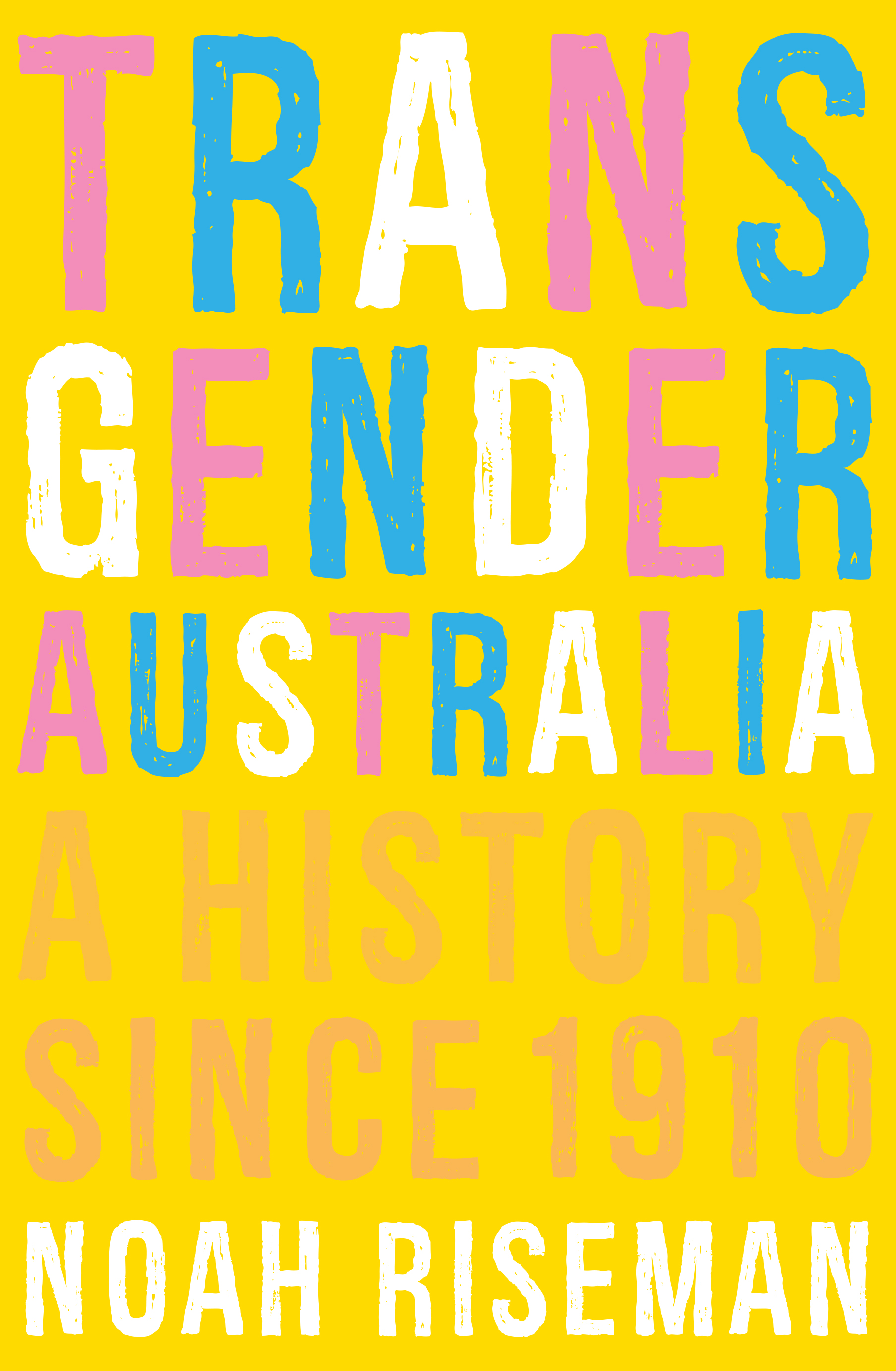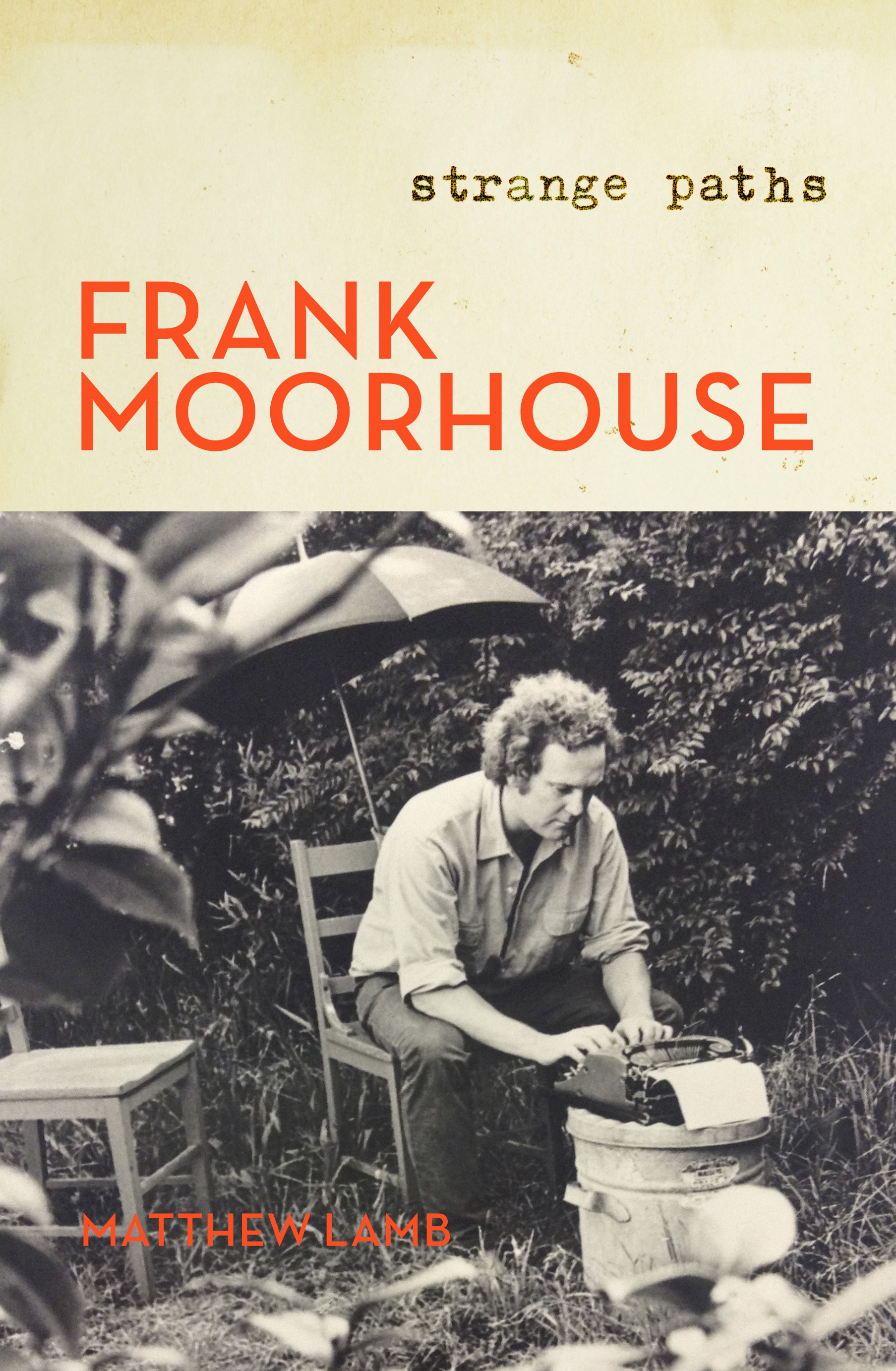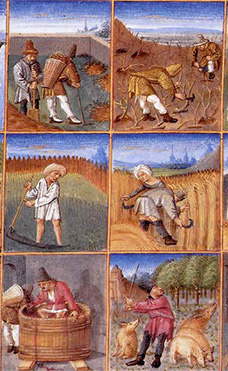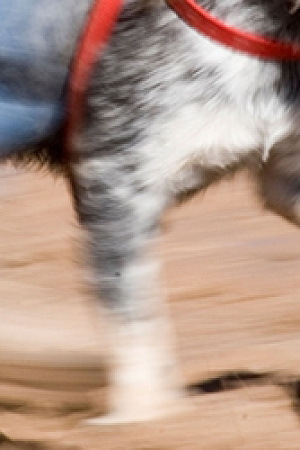Jolley Prize 2010: 'Sleepers' by Cate Kennedy
Ray was stuck in traffic, an unusual feeling in a town the size of his, inching forward through a detour round the railway crossing. He watched the orange text changing on the roadside electronic billboard in the kind of trance he had recently found himself lapsing into more and more. TRACK UPGRADE he read absently. DELAYS EXPECTED. DETOUR AHEAD.
He’d forgotten – they all had. Barrelled up to the intersection into town as usual to find the contractors had been hard at it from 6 a.m. just as they’d promised, a squadron of shining earthmovers and excavators hacking away already. Thousands of dollars being spent every minute by whatever construction company had won the tender. Not anyone local, that’s for sure. Ray might have had some contract work himself, then.
Up ahead, a guy in reflector sunnies, fluoro vest, and hard hat was propped next to a ‘stop/slow’ sign.
‘That’s gotta be the easiest money in the world,’ Ray’s girlfriend Sharon had said to him once in the car as they waited at some roadworks. Ex-girlfriend. Having a dig at him, Ray had thought, because he’d done a stint himself on a road crew the summer before.
‘Not always,’ he’d answered, knowing it wouldn’t do any good, but weighing in anyway. ‘Some motorists, they just get out of the car and king-hit you, because they’re sick of waiting. Two blokes have been run over deliberately, just holding signs like that.’
She’d given him a look. ‘That’d be why you get the extra loading, is it? Danger money?’
‘Go ahead and laugh,’ Ray had said with a shrug, releasing the clutch. They’d been on their way to his sister’s for a barbecue, he remembered, and looking at her he’d suddenly felt the same deep dragging inertia he felt now. The sight of her there, holding a cling-wrapped pavlova in the passenger seat, mouth a sour twist, her pink blusher sparkling in a shaft of sunlight. Something creeping over him like a slow anaesthetic.
‘I’ve tried,’ she said a few months later when she told him they were splitting up, ‘but it’s all going downhill.’
‘I thought we were going good,’ Ray had answered, hearing the whine in his voice, hating it, ‘and now you’re telling me you’re moving out.’
She’d rolled her eyes like he was the thickest kid in the class. ‘Not me, Ray,’ she’d said. ‘You. You’re the one moving out.’
SLOW, the sign said. And then the flashing arrow for the detour, down past the boarded-up hotel and the old saleyards. Ray yawned. He’d be late, but everyone would be late today, and the manager was never out the back anyway, at the warehouse where Ray worked three days a week, lucky to have that. So what if he was late? How many nested imitation terracotta pots could the public want in one morning? He idled, watching the traffic, exhaust shimmering in the dust raised by the labouring machines on the line, their battered metal teeth jerking and tugging at the railway tracks, trashing them.
Slow. Slow. Stop. Then flip, his turn.
The roadworker turned his mirrored and shadowed gaze to Ray as he drove past and gave a wave that had been reduced to its bare minimum – a single slow-motion finger lifted in acknowledgment that here was one man passing another man who was pretending to be doing a job of work, bored shitless and leaning on a one-word sign. Ray raised a finger off the wheel in response, glancing at the expressionless face and looking away again. Didn’t know him.
Up ahead he heard a splintering crack, like ice, as an excavator levered up one of the railway sleepers, the big engine surging to get purchase on the gravel.
By late afternoon, when Ray was at the pub, there was already talk of the sleepers.
‘They’re pushing them into piles,’ Frank was saying. ‘Sorting them from shit to good. So they’ve got to be selling them on.’
‘See, if that contractor was a local,’ said Vince, ‘anyone could go and help themselves to some of them for firewood. Anyone at all.’
‘Not these bastards. They’ll be selling them on to some other sub-contractor, any money. That’s why they’ve got that barrier round them. They tender for these jobs and they screw the last cent out of ‘em. That’s the way they do business,’ said Frank decisively. Frank, who hadn’t worked for fourteen months.
Afterwards when Ray drove Vince home down past the intersection he saw the old sleepers piled high – big dark timbers, rooted up now and useless. A string of flapping orange flags had been erected around them.
‘If that’s the barrier,’ Ray said, ‘it looks fairly token.’
‘Thing is,’ said Vince, pointing, ‘people’ll be after those for landscaping. You wait. And they’ll go to the other spot they’re working on, that old crossing out of town.’
‘They’re pulling all that up too?’
‘Mate, they’re pulling up five k’s of line – there’s gunna be millions of the things. Tons of ‘em. This company’ll never notice a few disappearing. You wait.’
Ray nodded. He’d seen gardens himself, of course, edged with old redgum sleepers. It was just the kind of thing Sharon had always been on his back to do, landscaping the garden.
‘Why do it,’ he’d argued, ‘when we’re just renting?’
‘Ray,’ she’d said, exhaling a breath of resigned frustration. He’d waited for an answer, but she’d only repeated it as she’d turned away. ‘Ray, Ray, Ray.’ Almost tenderly. And him standing there, stranded, never knowing what she was going to want next.
‘Redgum,’ Vince was saying now. ‘Beautiful. Burns like bloody briquettes. You watch this town – winter coming on and a pile of scrap wood like that. A little string of orange flags isn’t gunna stop anyone.’
The sleepers – those perfectly good redgum sleepers and a sudden professed desire to landscape – it was all Ray seemed to hear about over the next two weeks. Bernie at the warehouse told Ray, with a kind of defiant righteousness, that he’d grabbed a ute-load late at night to finish off his pool area. Someone at the pub achieved fame by liberating thirty sleepers in broad daylight with two mates, avoiding suspicion by donning fluorescent vests to do the job.
‘And that’s fair enough,’ Bernie said, slapping price stickers onto a shipment of outdoor furniture. ‘You can tell by the way those piles are graded that whoever’s got the tender is just going to put a match to the crap ones.’
‘I guess,’ said Ray. Inside the opaque layers of shrink-wrapped plastic on the pallet, he could see stacked ornamental Buddha statues. It was like gazing in to a submerged shipwreck, crammed full of calmly waiting monks.
‘I reckon get in now, and get what you need,’ said Bernie. ‘Just do it discreetly, and don’t take the new replacement stacks. Don’t get greedy.’
Ray lifted his knife and sliced through plastic, breathing in, as he tugged it off, the chemical, sealed breath of some factory floor in China. He thought of waking up that morning with an empty plate from last night still sitting on his chest, gently rising and falling, his hand keeping it steady, in exactly the same position he was when he’d fallen asleep. A white plate, round and innocuous as a moon.
At Steve’s barbecue that night, he walked up and down the brand new paved barbecue area bordered by lines of sleepers. Set at intervals in the newly-shovelled topsoil were small clumps of perennials, which reminded Ray somehow of a hair transplant.
‘It looks great,’ he called, feeling Steve’s eyes on him. There must have been something wrong with him, some bug he had – how else to explain this bottomed-out energy, the sapped, exhausted feeling as he watched Steve turning steaks on the grill? He’d go and have a check-up. A blood test.
‘A rustic border,’ Steve was saying. Full of focus and purpose, pressing here and there on the meat with the tongs. ‘That’s going to grow in no time.’
Ray swatted a mosquito in the dusk, racking his brain for something to respond with. Nothing.
‘We’ll have a pool in here next,’ Steve added. ‘Get rid of the lawn altogether. Just an outdoor entertainment area. You right there Ray?’
‘Yeah, good.’
‘You wanna grab yourself some coleslaw?’
‘Thanks.’ He levered himself up from the chair, putting down his warm beer. Another thing – these last couple of months, he’d felt this heavy squeezing under his sternum, slowing him down. Shouldn’t have worn shorts. Should cut down on the beer. He walked over to the trestle feeling the eyes of women on him; Steve’s wife Sue smiling over, other wives and girlfriends raising their heads to glance at him, going back to their wine. The only single man there, he realised, feeling something speculative in their glances, something indulgent.
He’d driven past Sharon’s house tonight and seen a car in the drive he didn’t recognise. He couldn’t stop thinking about it; his brain was like a dog jerking on the end of its chain over and over, returning to it. So that’d be the thing to do – get chatting to someone else, let word get back to Sharon that he was out there, available, a catch, on his feet. But even though he could feel those eyes on him (car in her drive, that convulsive jerk on his throat as he circled it again), he sat back down with his laden plate on one of the sleepers instead, because the thought of trying to get a conversation going with any of them felt like heavy lifting. And they knew all about him anyway; a thirty-five-year-old man who lived in a colorbond shed at a mate’s place, not exactly unemployed but a part-time storeman. A liability, not a catch.
Just temporary, he’d said when he first moved in to the shed, just till I find a place of my own. Back then he couldn’t imagine spending winter in it, holed up there with just the shed heater, the cold coming up through the cement floor. And how gradually it had happened, putting a piece of carpet down, buying the lounge suite at Vinnies that time, putting up the television aerial. Telling himself he was saving money. Finding his feet. Waiting for things to go from shit to good.
‘Hey, Ray,’ a voice was calling him. Steve’s teenage son. Scott. Sam. Something.
‘Come and check this out,’ the boy said, beckoning Ray over to a big black telescope on a tripod, pointed straight up into the night sky.
‘Not quite dark enough yet, Sean,’ Steve called from the grill, scooping meat and sausages up onto a platter. ‘Wait till it’s dark and I’ll show you how to adjust it properly.’
Ray stooped and looked carefully through the lens.
‘I think it’s Mars,’ said Sean. The smell of him – grass and sunscreen, sweat and energy, all of it barely contained – registered in Ray’s head with a sudden painful bloom. This shortness of breath, the pressure on his chest – he thought of his old man’s heart attack, the way he’d staggered crabwise across the lounge-room, his arm out, wordless. Take him five weeks to get a doctor’s appointment, anyway. He’d ring tomorrow.
‘Is that focused now?’
‘Yeah, that’s good,’ answered Ray. He could make out a blur, a jittery nebula like a reflected car headlight, but blinked and saw something else there in the lens, something dilating, sweeping closed and open again. His own huge eye reflected there; the lid creased, a maze of lines spreading like rivulets.
‘Is it Mars?’ Sean said doubtfully. He’d taken the boy out fishing one time, he remembered, with Steve; clowned around pretending to fight a carp he’d landed on the bank. Casting all day, that day, into snags. Ray blinked again, saw the pouched skin around his eye wrinkle like crumpled old paper, his own iris staring at him black as space. If he had a son now, he thought, he’d be fifty when the boy was fifteen. So probably all for the best, then. He let out a breath that hurt like a stitch.
‘Yep, that’s Mars,’ he said.
Turning the keys in the ignition in his car, he fought the impulse to go home via the house again, check if the car was still there. Up his old street, the same streetlight broken, up to the driveway that he used to pull into every night, taking that normalcy for granted. His ute bumping up over the curb and the sensor light snapping on as Ray got out of the car in his loser shorts, running to flab, any fool could see that. Then Sharon’s silhouette in the ridged glass of the front door, her and whoever was there with her. He saw her put both her hands up to the glass to peer through the distorting ripples of glass at him.
Don’t worry, he heard her saying, her voice muffled, it’s just Ray, seeing him for exactly what he was; he could hear that in her tone. Her right arm lifted and snapped off the sensor light impatiently, leaving him there in the dark, and the shapes of the two of them rippled and shifted as they stepped back from the door, Ray thinking he would never forget this one moment as their shadows swam together out of the light.
He opened his eyes and saw he was still sitting in his ute outside Steve’s place, his hands slack on the steering wheel. He tried to tally up the beers he’d had. Tried to send a message down to the deep-sunk part of him, skudding along somewhere, to kick-start itself again.
He had an idea – a half-arsed idea, he berated himself, a crap idea – to head down to the crossing and put down the tailgate and load in a few sleepers. Twelve, maybe. Enough to take around tomorrow to Sharon’s place. His mind swerved over this bit – the dropping them unannounced onto her front lawn – and went straight to the moment when he’d be levering them squarely and surely into place between some solidly-hammered pickets. And her surprised gratified smile, lost for words for once, as he went away and came back with a load of topsoil from Jenner’s and spaded it in. Her instant landscaped garden, ready for some seedlings.
He could manage loading them up himself, he was sure, if he raised one end first then pushed them onto the tray. Or get a mate. Get Vince to help him. He checked his watch – 12.40. Vince would be snoring in front of Rage by now, three bongs down.
It was when Ray got down to the track and saw the motionless machinery there, the dark mountains of sleepers silhouetted, that he felt his original plan begin to melt and solidify into something else. Why should he do a damn thing for Sharon? Hanging round her place like a whipped dog. Why shouldn’t he score some for himself? Take them home, cut them up with the chainsaw, make a decent firewood stack. He imagined, briefly, the shed heater ticking with cosy warmth, stoked with redgum, glowing all night. Or – and this was better – why shouldn’t he keep some whole, do some landscaping for himself, build up a couple of beds and plant some veggies out at the shed?
Ray realised he was at the crossing, sitting motionless again in the cabin, staring at the flattened earth where the railway track into town used to be. All of it scraped as bare as something strip-mined now. A plan dropped onto the town from above, not a single local employed. You could understand the ire, this harmless, face-saving looting of stuff pushed into unwanted piles. And he was so tired of this, the way he kept finding himself hunched over, eyes closed like he was hibernating, the way he had to rouse himself to move.
Ray stretched as he stood, his spine cracking. In the back he found himself a pair of gloves, let down the tailgate, and here came the moon, sailing out from behind a cloud, ready to help him. Sean, if he was still up, would be able to see every crater on that surface, it was so clear. Ray ducked under the orange flags and tugged at a sleeper, pushed and pulled it free, dragged it over to the ute and heaved it in with a grunt. Easy. Another one. Another. He’d only need ten. Some people he knew had taken dozens of the things. It felt good, even though it was the middle of the night, to be working up a sweat. Cold oxygen in his lungs prickling like stars, clearing his fogged head finally.
What could you grow in winter? Potatoes, maybe. Beans.
Ray was considering the pile absently, wondering which piece to haul free next, when bright blue lights rolled across it. A lazy roll, rhythmic and silent.
He’d been humming; hadn’t heard the cop car pull up.
And as he turned, squinting in their sudden high beam, his chest squeezing, all that traitorous warmth descending into his boots, he knew that they wouldn’t bother with their siren, because they could see that it was just him. Just Ray. They knew he’d turn just like this, and take what was coming to him. Because they need an example, he thought wearily as he peeled off his gloves, the realisation flaring like a little chunk of burning rock, a tiny meteor.
What was the word? An escape-goat? Nowhere to put the gloves, so Ray threw them onto the ute tray, and missed. The cops’ headlights casting big crooked shadows.
He waited there for them, next to the sleepers, lowering his bare hand for comfort onto weathered, solid old redgum, hauled up and discarded but with so much life in it, still, it just broke your heart to see it go to waste.
Cate Kennedy is the author of the award-winning story collection Dark Roots (Scribe, 2006) and the novel The World Beneath (Scribe, 2009), both of which were shortlisted for the Australian Literature Society Gold Medal. She is currently at work on a new book and a collection of new and selected poetry, The Taste of River Water, both due for release in 2011. She lives on a farm in North-East Victoria with her family.








Leave a comment
If you are an ABR subscriber, you will need to sign in to post a comment.
If you have forgotten your sign in details, or if you receive an error message when trying to submit your comment, please email your comment (and the name of the article to which it relates) to ABR Comments. We will review your comment and, subject to approval, we will post it under your name.
Please note that all comments must be approved by ABR and comply with our Terms & Conditions.